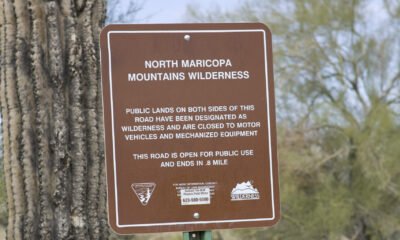2024 election
Empowered Women Unite: Protecting Abortion Access for Future Generations

A generation of women from Arizona, who found their lives impacted by the landmark ruling in Roe v. Wade, are now advocating for reproductive rights for their children and grandchildren. The ruling, recognized nationwide for nearly half a century, granted constitutional protections for abortion. This crucial decision, however, was overturned in June 2022, shifting the regulation of abortion back to the states.
Val Smith, a 64-year-old Tempe resident, recounted how a teenage neighbor had to clandestinely visit a pediatrician’s office to terminate a pregnancy shortly after the ruling. Smith, who was around 13 years old at the time of the Roe decision, recalled the stigma that surrounded abortion during that period. “It was really weird that a pediatrician would do it, and that she had to go at night,” Smith explained.
In response to the recent changes in abortion access, advocates are mobilizing support for Proposition 139, the Arizona Abortion Access Act, which is set to appear on the ballot in November. If passed, this act would amend the state constitution to allow abortions up until fetal viability, estimated at around 24 weeks, and potentially beyond that in certain medical situations.
Smith’s personal experience emphasizes the ongoing need for safe abortion access. After a devastating diagnosis during her own pregnancy, she faced significant challenges when doctors struggled to perform the necessary procedure. “It was a horrible experience, because the nurses thought I was terminating the pregnancy voluntarily, and they were really ugly about it,” she shared. This stark encounter highlights the stigma still present around abortion care.
Other advocates, like 67-year-old Julie Neff-Encinas, also share harrowing experiences that inform their activism. In the late 1990s, Neff-Encinas faced a critical medical situation during her third pregnancy, requiring an abortion to preserve her health. After enduring 39 hours of labor, she reflected on the trauma and uncertainty surrounding such decisions. “There was no point in waiting,” she said, voicing her frustration over current laws that could delay necessary care until medical emergencies arise.
In light of the changing political landscape, former President Donald Trump’s varying stances on abortion have raised concerns. While he has stated a preference for states to regulate abortion, he has also supported efforts that could lead to a nationwide ban. This inconsistency gives rise to fears among women like Heidi Ross, who warn that their hard-won rights may be eroded in the future.
Ross, diagnosed with a serious heart condition during a pregnancy, made the decision to terminate to protect herself and her two young sons. “I fight for my granddaughter, because I don’t know if she’ll have what I have,” she lamented. Her concerns resonate deeply as further state restrictions threaten access to necessary reproductive health services.
The stories of these women illustrate the complex interplay between personal health decisions and the political landscape surrounding abortion rights in Arizona. With the ballot initiative ahead, advocates are hopeful for a future where reproductive rights are safeguarded for generations to come.


















